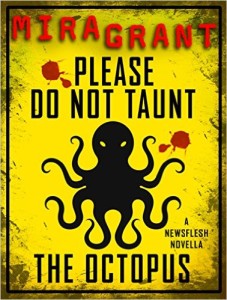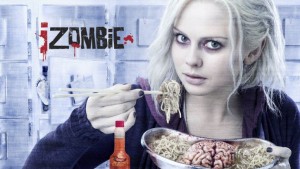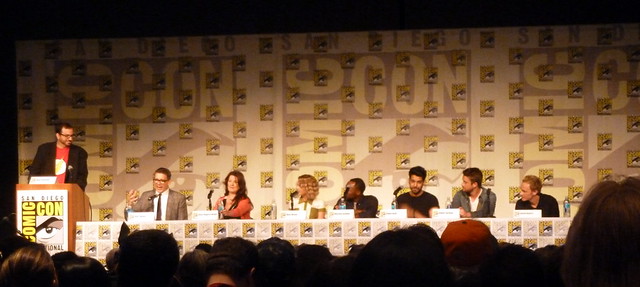
Category: Sci-Fi/Fantasy
Why Kilgrave’s Power is Scarier than a Jedi Mind Trick
With Jessica Jones and Star Wars: The Force Awakens both out, it’s hard not to compare Kilgrave’s power to Jedis’ ability to influence minds. But while we admire “You don’t need to see our identification” and laugh at “Republic credits will be fine,” Kilgrave is terrifying.
It’s not just that Jedi are compassionate and Kilgrave is a total sociopath with no regard for human life who would casually make someone kill or maim themselves just because he was having a bad day. Darth Vader is just as ruthless, but doesn’t bother with the technique (in the films, at least).
It’s that the “Jedi mind trick” is explicitly shown to be limited. It’s used rarely, and only for specific commands. The first time we see it used in A New Hope, Obi-Wan Kenobi describes it as “influence” rather than control and specifically says it only works on “the weak-minded.” Willpower is sufficient to guard against it. In Return of the Jedi, Jabba the Hutt even laughs it off when Luke tries to use it on him. The only time we see any sort of long-term suggestion it’s to “go home and rethink your life.” Presumably the dealer in Attack of the Clones will be in full command of his own faculties by then, having simply been prompted to start the soul-searching.
Kilgrave, however? His commands are absolute. No matter how hard you prepare mentally, no matter how strong your will, no matter whether your actions would go against your principles, or hurt you, or hurt someone else — even someone you care about — you do it. Immediately. None of the usual trying to stop your hand from moving that you see in a lot of movies where a mind-controlling character shows up. No apparent strain on his part to keep controlling you. Implanted commands can last for hours, and he can renew his control over and over as long as he wants to.
That’s scary enough right there. Putting that level of power in the hands (well, voice) of someone who sees other people as merely tools and playthings, and whose only behavioral boundaries consist in covering his own tracks? That’s nightmare-level stuff.
Think about it this way: Emperor Palpatine spent decades manipulating key people across a galaxy into putting him in a position of absolute control over thousands of worlds. Put him in a room with Kilgrave and he wouldn’t stand a chance.
Genre TV Update: Fall 2015
Somehow I’ve managed to end up watching mostly shows based on comic books this year. And amazingly, there are enough of them out there that I have to pick and choose. It seems I’m able to keep up with about 3 shows on a weekly basis, and still fit in family, work and other hobbies.
The Flash: I’m still amazed that 1. there’s a Flash TV show, 2. it’s good, and 3. it’s successful enough that it’s actually been renewed. This is the one show I make an effort to watch the night it airs, and I’m enjoying it a lot more than I’ve enjoyed the comic book in the last few years.
iZombie: The other show I’ve managed to stay current with. I’ve found that as fun as the case of the week is, it’s the continuing subplots that keep me coming back: the search for a cure, the back and forth with Blaine and the zombie population of Seattle, Major’s living hell, etc.
Supergirl: This has turned out to be a lot of fun, though I’m not *ahem* super-invested in it yet.
Agents of S.H.I.E.L.D.: Uneven. I’m finding the Inhumans storyline tedious, but then I’ve never liked that sort of story much. Simmons’ adventures on the other side of the obelisk, though….I’m really intrigued by that. (Note: I’m behind a couple of weeks, so I haven’t had a chance to watch “4,722 Hours” yet.) Update: “4,722 Hours” was absolutely fascinating. The Hydra/Inhumans stuff is really turning into a slog.
I am really looking forward to Jessica Jones. I was a fan of the original Alias comics, and this group did an amazing job with Daredevil. Update: It’s fantastic. Even better than Daredevil. But it’s intense enough that I only want to watch one episode at a time, when I can follow it with something lighter.
The Librarians: Fun popcorn adventure with a literary bent to it. Not sure I’m totally sold on Prospero and Moriarity as the villains, but if they follow last year’s pattern, they’ll mix things up.
Heroes Reborn: It was a lot better than I expected, but not enough to keep me.
Meanwhile, I’ve given up on “Once Upon a Time” completely. It just slowly turned into a parody of itself. “Castle” was still fun last I caught it, but too far down the priority list to keep up with it.
Do Not Taunt the Octopus
 Mira Grant has been writing yearly novellas set in the world of her Newsflesh trilogy. A generation after the zombie apocalypse, humanity has survived, adapted, and rebuilt civilization. While the trilogy focuses an a core group of characters, journalism, social media and American politics, the novellas have opened up more of the world.
Mira Grant has been writing yearly novellas set in the world of her Newsflesh trilogy. A generation after the zombie apocalypse, humanity has survived, adapted, and rebuilt civilization. While the trilogy focuses an a core group of characters, journalism, social media and American politics, the novellas have opened up more of the world.
“Countdown” reveals the early stages of the Rising, including a look at what two messed-up background characters were like before everything went to hell. “The Last Stand of the California Browncoats” looks at what would happen if an actual zombie plague wiped out Comic-Con. “How Green This Land, How Blue This Sea” jumps across the world to Australia, where the people take a very different approach toward managing the zombie virus. “The Day the Dead Came to Show and Tell” explores the implications of life with zombies on the school system, and it’s really freaking disturbing. The newest one refers back to it (not in any detail — it goes out of its way to not describe what actually happened), and it hit me again. That story sticks with you.
“Please Do Not Taunt the Octopus” is the latest, and picks up the tale of Dr. Abbey, who runs an underground virology research lab where they’re trying to cure the zombie virus without the politics constraining mainstream organizations like the CDC (which has its own issues), as they deal with industrial espionage, hackers, and some…surprise visitors. She grudgingly accepts the label of “mad scientist,” though she insists that while she is angry, she’s not crazy.
It’s a surprisingly upbeat story considering the setting, as is “How Green This Land…”
One interesting observation: It’s now 2015. In the Newsflesh world, the Rising took place in 2014. We’ve now branched into alternate universe territory, but there are references to historic events and pop culture that happened after the first novel came out in 2010.
Another observation: I followed this up by finally reading Unlocked, a novella detailing the background of John Scalzi’s novel Lock-In. It’s an interesting parallel, in that both Newsflesh and Lock-In pick up a generation after a devastating virus has swept the globe, killing and transforming people — in one case taking over the bodies as the mind dies, in the other leaving the mind intact but cut off from the body — and the technological, social and political changes made to deal with the new normal.
Looking Forward to iZombie
 iZombie has a premiere date! The comedy/horror/murder mystery show launches March 17 on the CW.
iZombie has a premiere date! The comedy/horror/murder mystery show launches March 17 on the CW.
I’ve been describing iZombie as a mash-up of the Robeson/Allred comic’s premise (woman becomes a zombie, but can keep her mental faculties as long as she eats one brain a month…then starts picking up memories and personality quirks from the brains she eats) with Pushing Daisies (someone able to communicate with the dead in an odd, but limited manner teams up with a detective to solve murders) and Veronica Mars (produced by Rob Thomas and Diane Ruggiero), all of which sounded promising, since I liked the iZombie comic, Pushing Daisies, and Veronica Mars. Based on the previews I’ve seen online and at SDCC last summer, that description is (if you’ll pardon the expression) dead-on.
CW has the first look trailer for the show.
ComicBookMovie has the official synopsis of the show. Rose McIver stars as the main character, Liv, who takes a job in the coroner’s office to satisfy her need for brains, but gets found out by her boss…who is actually quite fascinated. As she picks up memories and skills from murder victims, she helps a detective solve cases while seeking the man responsible for her own zombification.
The Hollywood Reporter has an extensive article talking with the producers and stars about the show’s tone, characterization, how Liv differs from Veronica, the nature of zombies on the show (if they don’t eat brains regularly, they turn into classic Romero-style zombies) and so on.
It looks like it will be a lot of fun, and while it’s got half-season-wonder written all over it, you never know. I mean, the fact that we got a second season of Pushing Daisies qualifies as a television miracle!
They Didn’t Know What They Were Getting Into: the Woods
Despite an overall 7.0 rating, there are a slew of one– and two-star reviews of Into the Woods on IMDB. Did these people see the same movie I did? As I looked through several pages seemingly sorted by rating, a few common threads emerged:
1. Too much singing! It’s a musical. Unfortunately, the trailers seemed to be trying to hide this fact.
2. It wasn’t a fluffy, happy family movie. Well, no. It’s supposed to be a darker, more complex take on the stories. Again, the ad campaign wasn’t entirely clear on this, and several people said they had expected it to be kid-friendly because of the Disney name. That says something about the power of the Disney brand (especially when associated with fairy tales), and makes me wonder if it would have been better to release it through, say, Touchstone.
Interestingly, the things people were most upset by are things that were toned down (or moved off-screen) from the stage version. I guess the studio shouldn’t have bothered with those notes. And one recurring complaint, Cinderella’s stepsisters’ more extreme efforts to get into the shoe, is actually in the Brothers Grimm version (where her name is translated as Ashputtel).
Those two threads are a failure of the ad campaign to prepare people for what they were going to see. (Though the viewers complaining that it’s “not PG” seem a little unclear on the concept of “Parental Guidance suggested: Some material may not be suitable for children.”) But then there’s this…
3. It should have stopped before the final act. That would be missing the point, which is to follow through with the consequences of what everyone did in act one, and the personality traits that brought them through it.
Consider: How does Cinderella fit in with the royal family? How does Red Riding Hood deal with the trauma of her experience with the wolf? How is Rapunzel affected by her life in isolation? The baker and his wife had a lot of trouble working together just to get their child; how are they going to handle raising him? The princes are still going to be charming, and they’re accustomed to the chase. And when you come down to it, Jack broke into someone’s house, stole a bunch of stuff, and then killed him.
Admittedly, the second act isn’t as strong in the movie as it is in the play, because they cut out a lot of it…but I’ve heard the same complaint leveled at the show. That would be like cutting the second act of The Fantasticks. You could perform just the first act, sure, but it would be much less meaningful.
Once you get to the three-star reviews, you find more people who still didn’t like it, but understood what it was supposed to be. They didn’t like the performances, or thought the story structure didn’t hang together, or just don’t like Sondheim, or knew it was going to be a darker take but still didn’t like it. Fair enough. Everyone has different tastes, and what works for one viewer doesn’t always work for someone else. But at least they disliked it for what it was, not for what it wasn’t.
Though it would help if the ads had been a bit more clear.
Quick TV Thoughts: Flash, SHIELD, Grimm, Castle, Once Upon a Time/Frozen
Five episodes in, The Flash has turned out to be a lot of fun. There are a few things that still bother me (the dead-mother plot being in every.single.intro., for instance, but it kind of has to be), but so far nothing has pulled me out far enough to stop me from enjoying the action and characters. I love that they’ve gone all-in on it instead of dipping one toe in at a time like Warner Bros. usually seems to do.
Marvel’s Agents of S.H.I.E.L.D. seriously leveled up this season. I’m a couple of episodes behind, but damn, this show has been knocking it out of the park. And I like that they’ve (mostly) been avoiding Idiot Ball tropes — if someone does something stupid, it’s because it makes sense for the character, not because the plot requires it. For example: So many shows would have had Coulson trying to keep his mental issues under wraps from everyone for half the season, but you find out right away that he’s told May, has her documenting it, and has Skye investigating it.
Grimm really needs to decide whether Wu knows about Wesen soon, or things are going to blow up. Or maybe that’s what they’re going for.
Castle almost lost me during the season premiere with the disappearance/amnesia mystery, but they pulled back from the brink by giving us (and Becket) solid evidence to support his story. They’ve managed to avoid falling into frog-eating clone territory. Still, since the show is mostly a standard police procedural, the only reasons to watch it are (1) the characters’ banter, which is still intact, and (2) the occasionally crazy plots. Speaking of which, “Meme is Murder” just barely managed to avoid being a Very Special Episode about how Snapchat Can Kill You! (tune in at 11). Barely.
Once Upon a Time….I want to like this season more than I do, but it’s just been dragging on.
Weaving the past and future from Frozen into the OUAT mythology has been interesting, particularly the way the Snow Queen was set up. Anna is probably the best cast — she’s absolutely the same character as in the movie, and even when her actions or speech *should* seem affected, it comes off as being natural for her. Elsa comes off as a slightly different, but still valid, interpretation. Kristoff just comes off as awkward.
But remember that thing I was saying about the idiot ball? Most of the time, characters do things because the plot requires it…or stand there not doing something because the plot (or a commercial break cliffhanger) requires it. Regulars, side characters, and guest stars alike. Except when the character motivation is the plot motivation, in which case rather than show it through action, they announce it loudly like a character in a fighting game.
(And they are totally wasting the Knave of Hearts. He was great in Once Upon a Time in Wonderland, but so far he’s been nothing but a one-note joke here.)
